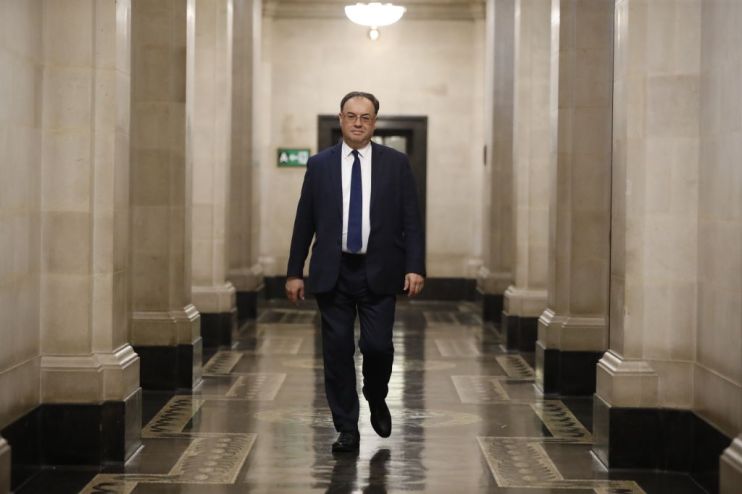Bank of England lookahead: Bailey set to ramp up QE but avoid negative rates

The Bank of England is widely expected to boost its asset purchase programme by at least £100bn tomorrow, as the central bank ramps up quantitative easing to shore up the UK economy.
Governor Andrew Bailey is set to bolster UK stimulus at the Bank’s Monetary Policy Committee (MPC) tomorrow, economists predicted. The expansion of quantitative easing (QE) would be an attempt to stabilise financial markets amid a huge increase in government borrowing.
Economists almost unanimously predict Bailey will keep the benchmark interest rate at a record low 0.1 per cent.
Bailey said last month that it would be “foolish” to rule out negative interest rates. But policymakers have hinted that the central bank needs more time to weigh up the risk of entering negative territory.
Economists expect Bank of England to ramp up QE
Interest rates are already slashed to a record low and not likely to go lower. That makes the BoE’s QE programme its main tool to combat the coronavirus downturn.
Under the scheme, the central bank creates money to buy up bonds faster than the government is selling them in order to prevent a flood of new debt from pushing up the cost of borrowing.
In March, as Covid-19 began to hit the British economy, the Bank introduced a new £200bn asset purchase programme and slashed its main rate from 0.75 per cent to 0.1 per cent.
But if its bond purchases continue at the current rate, the BoE will run out of funds by the start of July.
Robert Stheeman, head of the government’s Debt Management Office, said in April that the Bank’s asset purchase programme was key to stabilising the market, adding that interest rates would have been “massively higher” without QE.
Economists predict the MPC will vote to boost bond-buying firepower by at least £100bn at its June meeting.
This would allow the BoE to continue buying up government and some corporate debt at its current rate until the committee’s next meeting in August.
However, predictions over the exact amount vary.
How much extra stimulus will the Bank approve?
Saxobank head of macro analysis Christopher Dembik is predicting an increase of £150bn. Meanwhile, analysts at Citi and RBC Capital Markets are predicting a massive £200bn increase.
UBS economist Anna Titavera expects the Bank to announce an additional £100bn of QE. But she predicts the pace of bond-buying will slow.
“We expect the weekly pace to slow to around £8bn-£10bn from the current £14bn, reflecting tentative hopes that the worst of the economic impact of Covid-19 may have passed, meaning it will take until mid-September for the MPC to complete the new purchases,” she told City A.M.
Analysts at Capital Economics forecast that further QE of at least £100bn will be announced tomorrow.
They expect the central bank to announce another £100bn of QE at both of the MPC’s August and November meetings. And £50bn of QE could follow in February 2021. This would take the total amount of QE introduced following the coronavirus crisis to £550bn.
“In the end, the Bank will probably end up loosening policy by much more than the market currently expects,” said Capital Economics’ Thomas Pugh.
Negative rates on the horizon, but not imminent
Most economists are not expecting the Bank to cut interest rates below their current record low level tomorrow. However, there are increasing indications that negative rates are on the horizon.
Bailey’s admitted in May that the BoE was considering the introduction of negative rates for the first time in its history. But the governor stressed the Bank needed more time to consider the implications of such a move.
Rabobank senior market economist Stefan Koopman thinks the Bank is likely to continue pushing the message that negative interest rates cannot be ruled out. But he says it is unlikely the Bank will take action any time soon.
“We don’t think that the Bank sees a real need to cross this rubicon yet,” he said. “Instead, we think that this discussion is predominantly used to signal that the Bank has not emptied its toolbox yet.”
IG chief market analyst Chris Beauchamp is also “sceptical” about the possibility of the BoE opting for negative rates.
Beauchamp said the “continued refusal” of US Federal Reserve chair Jerome Powell to consider negative rates as an option “gives Bailey the cover to stick to his guns on this”.
“While negative rates remain a possibility, it looks too early to try now. [It] may be a bit of a stable door moment later in the year if there are signs of a nascent recovery,” he told City A.M.